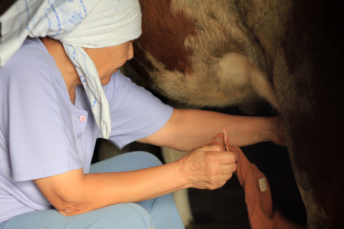
I don’t know who Rep. Salud Carbajal (D-CA) is, but the quote that was attributed to him recently in the wake of the 40 or so members of the House of Representatives introducing bipartisan legislation that would allow thousands of undocumented farm workers with a path to legal status in exchange for farms’ mandatory participation in a system to verify employee immigration status, was spot on (i.e., “This is a big freaking deal”)!
Of course, it’s not a panacea, but it is for sure a step in the right direction. At its top line, the , introduced by Rep. Zoe Lofgren (D-CA) and some 40 plus of her Republican and Democratic colleagues, expands both permanent and temporary immigration for agricultural purposes, and, very importantly, legalizes illegal farmworkers already present in the United States. Most pundits expect that it will pass the House of Representatives by a broad bipartisan margin, perhaps before Thanksgiving. Of course, I have no idea what will happen once it hits the Senate.
What exactly am I talking about? The H-2A nonimmigrant visa is available to foreign workers who are seeking to enter the United States to perform agricultural labor or agricultural services of a temporary or seasonal nature. Agricultural is defined to include farming in all its branches (including dairy farms), the raising of livestock, and any practices (including forestry and lumbering) incident to or in conjunction with farming operations, including preparation for market and delivery to storage or to carriers for transportation.[1] Although the definition of farm includes dairy farms, the current H-2A nonimmigrant visa program only allows employers to hire workers for “temporary or seasonal” services, and dairies end up being disqualified because they need assistance throughout the entire year.
I can’t tell you how many referrals I get from colleagues, or calls from potential clients, practically begging me to help them bring in foreign workers (and yes, in some cases, to figure out a way to “legalize” individuals that may be currently working for them) so they can work in jobs that … wait for it … American workers don’t want to do (e.g., getting up at 3:00 in the morning to milk a cow). According to the U.S. Department of Agriculture, New York farms employ about 55,000 people; nationally, half of agricultural workers are believed to be undocumented.[2]
Unfortunately, the proposed legislation maintains and incorporates into the law the current and overly bureaucratic regulatory structure of the existing H-2A program, and it also mandates what some argue is a flawed and ineffective E-Verify employment verification system. But I repeat, it’s a start and importantly, it’s a bipartisan effort in a time when such efforts seem very few and very far between,
So, what would this legislation do?
- It would increase the number of “green cards” for permanent agricultural workers. Specifically, it would create 40,000 new green cards for agricultural workers; it would allow H-2A nonimmigrant workers to be sponsored for green cards; after ten (10) years, it would allow H-2A workers to apply directly without the new of an employer to sponsor them; and it would allow for indefinite extensions of H-2A nonimmigrant status for those waiting for a green card (where there may be a backlog in their immigrant category).
- It also would somewhat improve the current H-2A nonimmigrant visa program. Specifically, it would freeze the minimum wage in 2020, prohibit increases in the middle of contracts, and limit annual wage increases to no more than 3.25 percent; after 2030, it would mandate the creation of a new minimum wage calculation; it would create a single online portal for H-2A employers to file job orders, labor certifications, and H-2A petitions; it would provide a longer grace period for H-2A workers to find another employer; it would create a pilot program for “portable” H-2A workers; it would reduce what is known as the 50 percent rule to 33 percent of the job period (currently, H-2A regulations require employers to hire U.S. workers who apply through 50 percent of the contract period—in other words, even after the H-2A workers arrive and begin working); and it would extend the H-2A visa validity period from 1 to 3 years.
- It also would legalize existing farmworkers. Specifically, it would provide a renewable legal status to illegal farmworkers with 180 days if proven farm worker experience; it would provide a renewable legal status to spouses and minor children of those same legalized farmworkers; it would provide permanent status to a worker that has ten (10) years of experience on U.S. farms prior to the enactment of the bill; and it would provide H-2A nonimmigrant status for other illegal workers.
The H-2A visa program, like its H-2B cousin for non-agricultural temporary workers, is an absolute necessity for U.S. employers across so many agricultural industries. Simply put, U.S. workers do not wish to perform the jobs that H-2A nonimmigrants fill. It has been a problem for longer than I’ve been practicing law. In an era where Congress can fairly be described as dysfunctional, the introduction of this important legislation provides a glimmer of hope to those employers.
[1] 20 CFR §655.103(c).
[2] See https://www.doleta.gov/naws/research/docs/NAWS_Research_Report_13.pdf.
